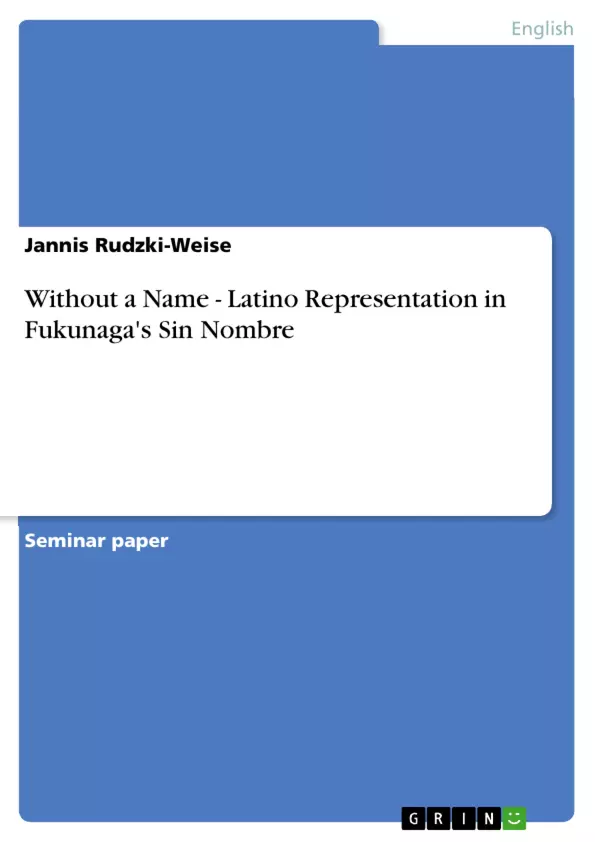This paper discusses the film Sin Nombre (2009), directed by Cary Joji Fukunaga, in relation to the portrayal of Latinos/as, and whether this film can be considered a piece of the “Culture Industry.” For the analysis of the movie, I apply the concepts discussed in class. Also, I compare this motion picture with some of the themes which Elana Zilberg describes in her essay “Fools Banished from the Kingdom: Remapping Geographies of Gang Violence between the Americas (Los Angeles and San Salvador)”.
The plot of this “fusion of a road movie, gangster epic[,] [w]estern and tragic romance” (Wood 1) is set in Latin America. It narrates the journey of Sayra, who is the main character and is played by Paulina Gaitán, going from Honduras to New Jersey. She travels with her uncle and father—the latter has been recently deported from the US. The purpose of the trip is to join their family in the U.S. where she hopes to be able to lead a better life.
Inhaltsverzeichnis (Table of Contents)
- Without Name – Latino/a Immigration in Fukunaga's Sin Nombre
Zielsetzung und Themenschwerpunkte (Objectives and Key Themes)
The objective of this paper is to analyze Cary Joji Fukunaga's film Sin Nombre (2009) and its portrayal of Latinos/as within the context of the "Culture Industry." The analysis utilizes concepts discussed in class and compares the film with themes from Elana Zilberg's essay, "Fools Banished from the Kingdom."
- Latino/a immigration to the U.S.
- Portrayal of gang culture (MS-13)
- Challenges to stereotypical representations of Latinos/as in film
- Transnational identity
- Authenticity in filmmaking
Zusammenfassung der Kapitel (Chapter Summaries)
Without Name – Latino/a Immigration in Fukunaga's Sin Nombre: This paper analyzes the film Sin Nombre, focusing on its depiction of Latino/a immigration to the U.S. and its departure from typical Hollywood stereotypes. The film follows Sayra, a young woman traveling from Honduras to the U.S., and El Casper, a member of the MS-13 gang. Their journey highlights the dangers and complexities of undocumented immigration. The film notably avoids simplistic portrayals of both the immigrants and the gang members, presenting a nuanced perspective on their humanity and struggles. El Casper's actions, motivated by self-preservation and a desire to protect Sayra, challenge the simplistic portrayal of gang members as purely violent. Sayra, defying passive female stereotypes, actively pursues her goal of reaching the U.S. The film's authenticity is strengthened by the use of Latino actors and the director's immersive research, including firsthand experiences traveling with immigrants. The analysis considers the film's success in encoding a complex message about immigration and gang culture, and its subsequent decoding by the audience. The film's thematic resonance with real-world issues, such as deportation policies and the expansion of MS-13, further underscores its significance.
Schlüsselwörter (Keywords)
Latino/a immigration, Sin Nombre, MS-13, gang culture, stereotypical representation, transnational identity, authenticity, film analysis, cultural industry.
Frequently Asked Questions: Analysis of Cary Joji Fukunaga's *Sin Nombre*
What is the main focus of this academic paper?
This paper analyzes Cary Joji Fukunaga's film Sin Nombre (2009), examining its portrayal of Latino/a immigration to the U.S. and its representation of gang culture (specifically MS-13) within the framework of the "Culture Industry." It challenges stereotypical representations and explores themes of transnational identity and authenticity in filmmaking.
What are the key themes explored in the film and the paper?
Key themes include Latino/a immigration to the U.S., the portrayal of gang culture (MS-13), the challenge to stereotypical representations of Latinos/as in film, transnational identity, and the concept of authenticity in filmmaking. The paper also compares the film with themes from Elana Zilberg's essay, "Fools Banished from the Kingdom."
How does the film *Sin Nombre* portray Latino/a immigrants and gang members?
The film avoids simplistic portrayals, presenting a nuanced perspective on the humanity and struggles of both immigrants and gang members. It follows the journeys of Sayra, a young Honduran woman migrating to the U.S., and El Casper, an MS-13 gang member. Their experiences highlight the dangers and complexities of undocumented immigration, challenging common stereotypes.
What is the significance of El Casper's character in the film?
El Casper's actions, driven by self-preservation and a desire to protect Sayra, challenge the stereotypical portrayal of gang members as purely violent. This adds depth and complexity to the narrative.
How does the film address the issue of authenticity?
The film's authenticity is enhanced by the use of Latino actors and the director's immersive research, including firsthand experiences traveling with immigrants. This contributes to the film's success in conveying a complex message about immigration and gang culture.
What are the main arguments of the paper regarding the film's success?
The paper argues that the film successfully encodes a complex message about immigration and gang culture and that its subsequent decoding by the audience is significant. The thematic resonance with real-world issues, such as deportation policies and the expansion of MS-13, further underscores its importance.
What keywords are associated with this analysis?
Keywords include Latino/a immigration, Sin Nombre, MS-13, gang culture, stereotypical representation, transnational identity, authenticity, film analysis, and cultural industry.
What is the overall objective of this academic paper?
The objective is to provide a comprehensive analysis of Sin Nombre, using concepts discussed in class, and to examine how the film portrays Latino/a experiences within the context of the Culture Industry.
- Quote paper
- Jannis Rudzki-Weise (Author), 2010, Without a Name - Latino Representation in Fukunaga's Sin Nombre, Munich, GRIN Verlag, https://www.grin.com/document/163359



